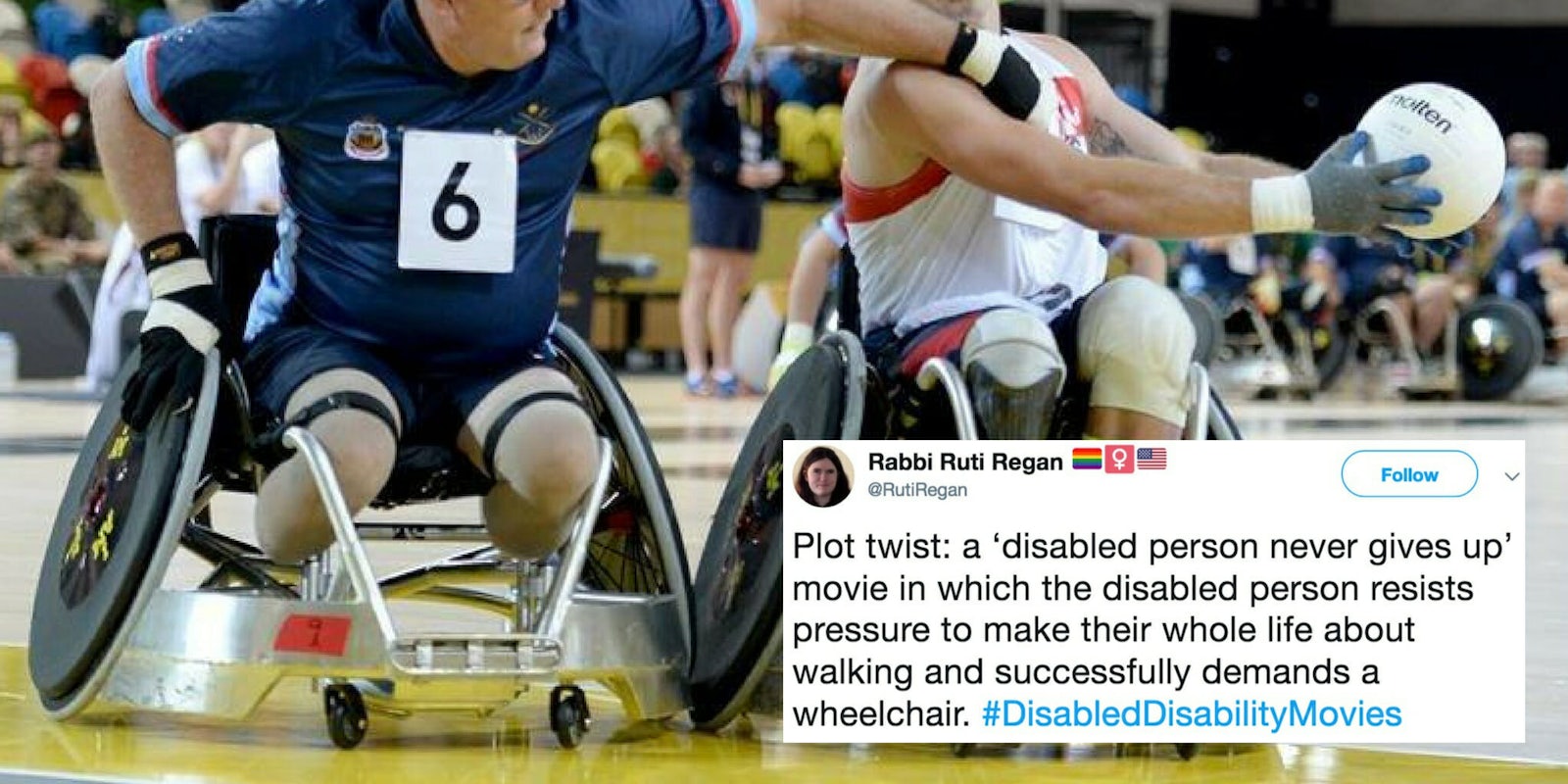The past two years of blockbuster hits featuring underrepresented communities, such as Black Panther and Crazy Rich Asians, have reaffirmed that representation in media matters. However, it’s not enough to just check a box by having actors that look like the communities they’re portraying.
Any well-intentioned piece of media can have a negative impact on an entire group of people without writers, actors, plot lines, and a production crew that actually understand the narrative they’re portraying. Which is why the hashtag #DisabledDisabilityMovies shouldn’t just be a theoretical script-flipping of “inspirational” films portraying people with disabilities, but a real call to action for the people involved in the creation of these films.
On Wednesday, Ruti Regan, a feminist rabbi and disabled disability advocate, began tweeting with the hashtag #DisabledDisabilityMovies, sharing the ways in which a movie should portray disabled people, as opposed to how movies actually do. (Regan didn’t immediately respond to the Daily Dot’s request for comment.) For examples, Regan wrote, instead of a disabled person being pressured into focusing their life’s work on walking in an effort to show that they “never give up,” the person instead demands a wheelchair.
Plot twist: a ‘disabled person never gives up’ movie in which the disabled person resists pressure to make their whole life about walking and successfully demands a wheelchair. #DisabledDisabilityMovies
— Rabbi Ruti Regan (@RutiRegan) October 17, 2018
And instead of a buddy comedy featuring a person with disabilities being helped by another to “overcome disability through the power of love,” the director would rightly know that this is no comedy, but a horror movie instead, Regan wrote.
Plot Twist: A lonely disabled person is befriended by someone who wants to help her overcome disability through the power of love. It's directed by someone who knows that it's a horror movie. #DisabledDisabilityMovies
— Rabbi Ruti Regan (@RutiRegan) October 17, 2018
And the ghosts of people who died in institutions? No, they aren’t playing into the “haunted asylum” trope. They’re helping the other people currently institutionalized to “resist gaslighting and demand justice.”
Plot twist: a haunted asylum movie in which the ghosts of people who died in institutions haunt living institutionalized people — and help them to resist gaslighting and demand justice. #DisabledDisabilityMovies
— Rabbi Ruti Regan (@RutiRegan) October 17, 2018
Regan’s narratives, and those of others who have shared under the hashtag, show an alternative reality in which people with disabilities sculpt these narratives for film and TV, instead of serving as “inspirational” fodder for people to watch and feel good about themselves for watching.
A Batman reboot in which one of his constant incredibly dangerous activities results in a spinal cord injury. He quickly figures out that he can still be Batman because everything he's ever done has depended on assistive technology anyway.#DisabledDisabilityMovies
— Rabbi Ruti Regan (@RutiRegan) October 18, 2018
Plot twist: one of those ‘he doesn’t want to live like this’ movies where everyone thinks preferring death to disability is heroic, but it’s directed by someone who knows it’s a horror movie. #DisabledDisabilityMovies
— Rabbi Ruti Regan (@RutiRegan) October 17, 2018
#DisabledDisabilityMovies "Mercy", a crime-fighting murder mystery in which a group of disabled people work together to catch the serial ~mercy killer~ who poses a deadly threat to all of them.
— Rabbi Ruti Regan (@RutiRegan) October 18, 2018
A cyberpunk movie in which none of the characters think that feeding tubes or ventilators are existentially frightening. #DisabledDisabilityMovies
— Rabbi Ruti Regan (@RutiRegan) October 18, 2018
#DisabledDisabilityMovies "Tell your story" A coming of age and coming out story. After years of telling what everyone with power refers to as 'her story' to crowds of eager adults at awareness events, Lily starts insisting on telling her actual story.
— Rabbi Ruti Regan (@RutiRegan) October 18, 2018
Through the hashtag, disabled people are asserting that many of these “overcoming disability,” “horror asylum,” “death over disability,” “disability awareness” narratives are actually harmful, and reinforce negative, inaccurate stereotypes about them and the kinds of “obstacles” they face. Instead, the hashtag squashes ableist movies about people with disabilities and shows that movies about people in the community should be like any other adventure, horror, sci-fi, rom-com film—just with an accurate portrayal of, without an exploitive fixation upon, the way the person moves through the world.
A movie where the people using sign language actually make sure that the person they are talking with is looking first, you know, the way real signers do. #DisabledDisabilityMovies
— April Spectrum, BA.🔋🦓💤🛸🏳️🌈🤝🐈 (@AprilSpectrum) October 18, 2018
#DisabledDisabilityMovies a movie about whatever other thing (being on a spaceship! Fighting evil wizards! Solving a murder!) where one or more main characters need and have caregivers and this is just a thing that's there.
— Imagining I (@imaginingi) October 17, 2018
Teen romcom about nerdy autistic protagonists who find love after a "reverse" make over montage, where they learn to stop masking and be themselves#DisabledDisabilityMovies
— Rosella Altman 🐱🥄📖🦓 (@zelliej1) October 18, 2018
A cranky but brilliant doctor who limps uses her experience to establish empathetic rapport with patients with mysterious ailments. And a little sex. (But not the boundary-violating kind between docs and patients.) #DisabledDisabilityMovies
— Tales From the Crip (she/her) (@IngridTischer) October 18, 2018
#DisabledDisabilityMovies A movie where a #disabilityrightsactivist learns they are #ableist
— Karen BE (@KarenBE9) October 18, 2018
https://twitter.com/theoriesofminds/status/1052807777880424448
A teenager fights against their school, guidance counselor, and teachers to get accommodations.#DisabledDisabilityMovies
— Elizabeth M. (@ElizIsExhausted) October 18, 2018
https://twitter.com/morebookstofind/status/1052827171029319680
READ MORE:
- How to talk about disability issues on the Internet
- Apple wants emoji that represent people with disabilities
- People with disabilities have launched a virtual march—so they can participate too
Ultimately, these ideas, too, are critiques for the ways in which society is generally ableist and negatively treats disabled people. These movie pitches aren’t just suggestions for how the entertainment industry should change its treatment of people, but suggestions for how people without disabilities need to shift and humanize people with disabilities as a whole.
